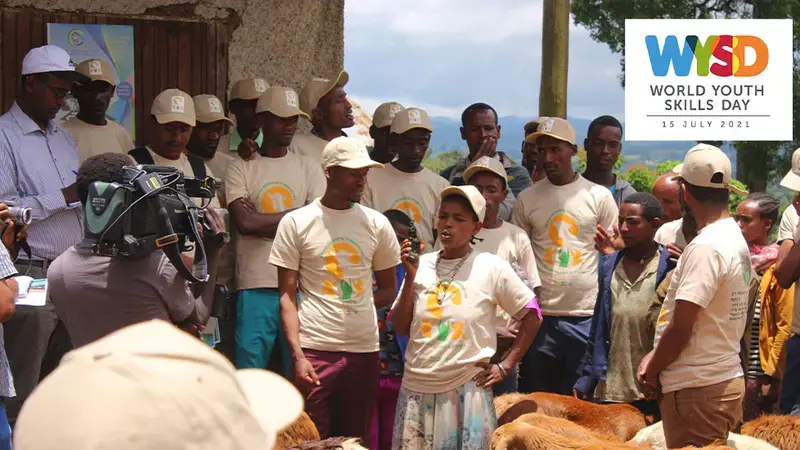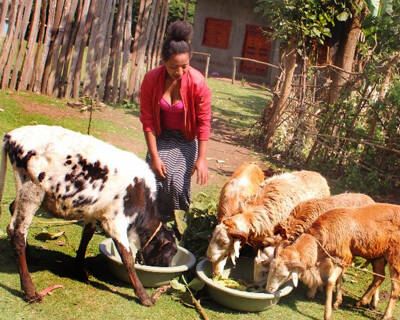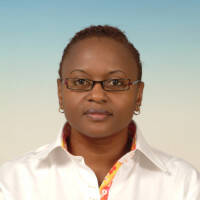Women and Youth can Transform Economies - if Given the Chance

ICARDA would like to acknowledge the donors and partners who made this work possible: The CGIAR Research Program on Livestock (CRP Livestock)), the Southern Agricultural Research Institute (SARI) and the Amhara Regional Agricultural Research Institute in Ethiopia, The African Development Bank, and the Technologies for African Agricultural Transformation Program (TAAT).
By Dr. Jane Wamatu
Amsalech welcomed me to a coffee ceremony in her homestead. Sitting in shade while she brewed coffee beans to make buna, served with the typical snacks kolo, I watch fat healthy-looking sheep milling around, and Yodit, dressed smartly in school uniform, counting fingers, struggling with her homework.
A year ago, Amsalech owned just a single skinny ewe, and her children stayed home to carry out household chores or work in the family smallholding. For hundreds of thousands of young women in Ethiopia, owning a successful business is a distant dream. Amsalech is one of relatively few who made good through one of our programs.
I feel a sense of desperation to see masses of young Ethiopians unemployed, their potential wasting. It creates a spiral of high burden ratios in families and communities. Family members with opportunity save less while supporting those without.
It’s a story echoed worldwide, particularly where ICARDA works within CGIAR, the world's largest agricultural innovation network. In dry vulnerable regions that are characterized by resource-poor smallholder farmers, women and youth, often last in line, face additional challenges such as gender-based inequalities and unemployment.
I know the challenges first-hand. In many sectors, including my own, we see progression towards more respect and opportunities for women. But even where cultural and structural barriers affecting women have been broken down, issues of women’s assertiveness, or lack of it, persist.
Most communities in our project sites are patriarchal, so male dominance in the economy and decision-making prevails.
Women show lower educational levels, a perennial lack of confidence, and ingrained risk aversion. While among youth, lack of opportunity leads to idleness and boredom, which leads to anti-social behavior.
CGIAR sees women and youth as pro-active engines of innovation and change-makers in their communities, invoking a desire in me to help empower and attract them into businesses related to improved livestock production.
We design small to medium-sized sheep fattening enterprises with start-up packages that create more jobs per unit of investment, providing an ideal starting point for women and youth with a low capital base. We also provide innovative, science-based solutions and social innovations for communities, tailored to localized conditions and environments to enable ownership.
For example, Asmalech enrolled in an ICARDA start-up sheep fattening package and quickly joined other women in her village to form a sheep fattening group with a champion farmer as a mentor.
Entrepreneurial opportunities result in economic empowerment, and most importantly, a sense of purpose to which one needs to dearly grip through life’s progression. Asmalech demonstrates how that sense of purpose influences not just lifestyle but also attitude and mindset - the realization that life can be better.
Once women and youth earn an income, they become more independent and develop a healthier self-esteem. They feel happier to be in control of their future and, like Asmalech, who is now leader of her sheep fattening group, become more confident.
In addition, those in the project often continue developing their skills. They attend training, exchange visits, field days and are eager to learn improved methods that will further enhance their productivity or income.

Women and youth on the project can earn profits comparable to experienced sheep farmers in the country. As a result, several youths are now increasing the number of fattening rams during each cycle. We also see many returning to school to complete their education or providing their children with the learning opportunities they missed.
Nevertheless, challenges persist. The fledgling entrepreneurial culture is weak, and innovation management capacities should be developed. Youth employment government offices, the first and immediate contact for communities at local level, need to be better positioned as influential triggers for an entrepreneurial culture, identifying more entrepreneurial opportunities and channeling information back to youth and women.
Mechanisms are required to support the offices to gather information on raw material and inputs suppliers, prevailing demand patterns and general market information, and support services such as training on management, financial literacy, technology, and innovations.
Development actors should align with the development priorities of local governments and liaise with existing youth employment offices to target and identify beneficiaries.
In most cases, youth and women simply do not access essential information.
Moreover, they don’t know that support is locally available, so ICARDA lobbies governments to coordinate and synchronize knowledge flow between the regional and local levels, development actors, and communities.
ICARDA guides women and youth to turn their transformative ideas into ventures. But the actions are driven by them. They must develop their own desire and energy to capitalize on what is on offer.
When the opportunity came to Amsalech, she seized it and made it her own. By unlocking her unexploited potential to run a successful business and motivating her fellow young women, I see someone more than my equal. I had lifelong opportunities. Until recently, Amsalech did not.
---------------------------------------------------------------------------------------


Dr. Jane Wamatu is a Small Ruminant Nutritionist at ICARDA
